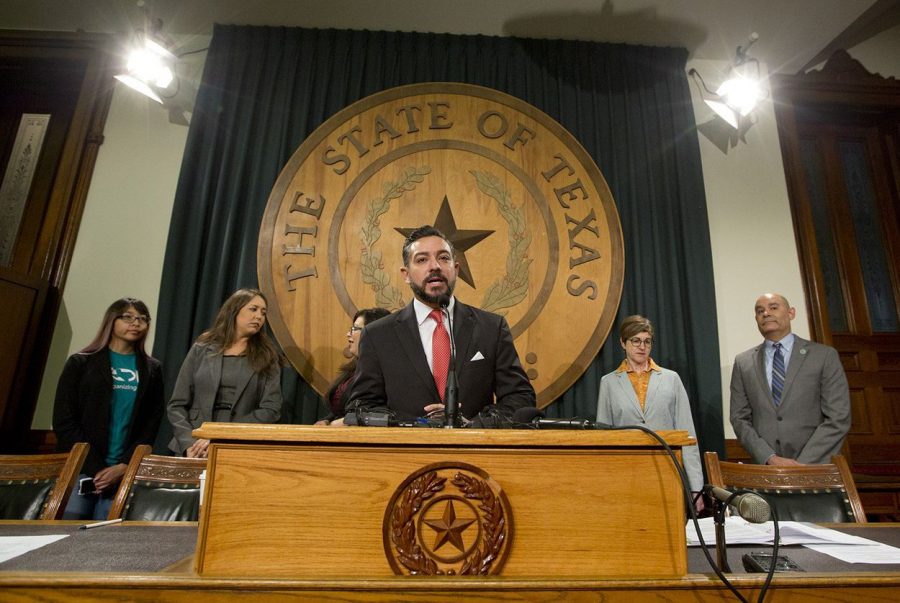Trump administration sued for proposing addition of citizenship question to census
The Texas-based groups allege that the addition of the controversial question is unconstitutional
The Trump administration’s “inclusion of a citizenship question in the 2020 Census is arbitrary and capricious, an abuse of discretion, and otherwise not in accordance with law,” the plaintiffs wrote in their filing.
May 31, 2018
The Mexican American Legislative Caucus and the Texas Senate Hispanic Caucus are suing the Trump administration in hopes of blocking the addition of a citizenship question to the once-a-decade census of every person living in the United States.
In a lawsuit filed Thursday in a Maryland-based federal court, the Texas-based groups allege that the addition of the controversial question is unconstitutional because it will lead to a disproportionate undercount of Latino and Asian residents, noncitizens and their family members.
That undercount would endanger billions of dollars tied to social services funding and deprive those individuals of equal representation in the U.S. House and during the redrawing of political boundaries that follows each census count, the plaintiffs allege.
The lawsuit against the U.S. Census Bureau and the U.S. Department of Commerce comes about two months after the bureau announced it would add a question about citizenship to the 2020 census questionnaire. Since then, demographers, local officials and community organizers have been sounding the alarm about the role the question would play in depressing response rates among Texas immigrants and their families.
The lawsuit was filed on behalf of more than a dozen plaintiffs — including several Texas-based nonprofits that advocate for Latino residents and legislative Latino caucuses out of multiple states — who say they are seeking to “preserve the integrity” of the census count.
The Trump administration’s “inclusion of a citizenship question in the 2020 Census is arbitrary and capricious, an abuse of discretion, and otherwise not in accordance with law,” the plaintiffs wrote in their filing.
The suit alleges the citizenship question violates the Constitution’s Equal Protection Clause because it is “motivated by racial animus” toward Latinos, Asians, noncitizens and immigrants and would amount to a violation of the Enumerations and Apportionment Clauses.
Massive in both size and population, Texas has long been a hard-to-count state because of the millions of Texans who fall into the categories of people who pose the biggest challenges for the headcount — immigrants, college students, and children younger than 5 years old, to name a few.
In announcing the addition of the citizenship question back in March, Secretary of Commerce Wilbur Ross indicated the citizenship-related data was necessary for “more effective enforcement” of the federal Voting Rights Act.
Those working toward an accurate count said they were already working from behind even before the Trump administration announced it would add the citizenship question to the questionnaire. They said they were bracing for challenges both practical — Hurricane Harvey displacement, internet accessibility and fewer funds with which to knock on doors — and political — namely anti-immigrant rhetoric and fears that people would be too afraid to respond to a government questionnaire — that would make Texas even tougher to count.
The census determines how many representatives Texas is entitled to elect to Congress and serves as a roadmap for the distribution of billions of federal dollars to the state and local communities, including funding for low-income housing, medical assistance and transportation projects.
As they embark on preparations for the 2020 count, local officials have also stepped into the legal fight over the citizenship question in court. Earlier this month, three border counties — El Paso, Hidalgo and Cameron — joined a coalition of more than 30 states, cities and counties that has also sued to block the inclusion of the citizenship question.
Meanwhile, the state’s Republican attorney general, Ken Paxton, has made clear he has no intention of fighting the question. In an op-ed published in March, Paxton chalked up concerns about the citizenship question as “partisan uproar” that is not “being driven by the facts.”
The Census Bureau is still waiting for congressional approval of the 2020 questionnaire that includes the citizenship question. The bureau has not asked all households about citizenship since the 1950 census, though it does ask about citizenship as part of annual surveys that only cover a sample of U.S. residents.



